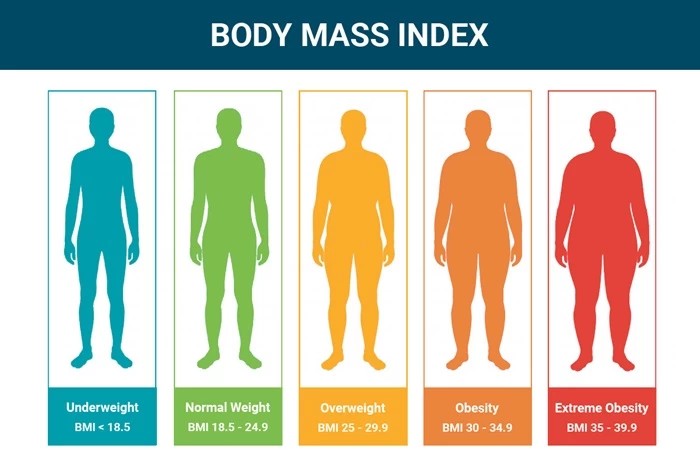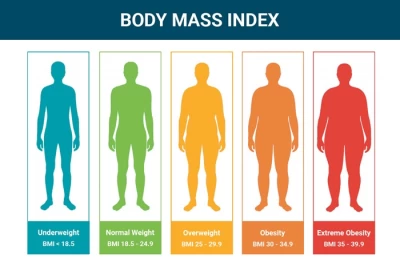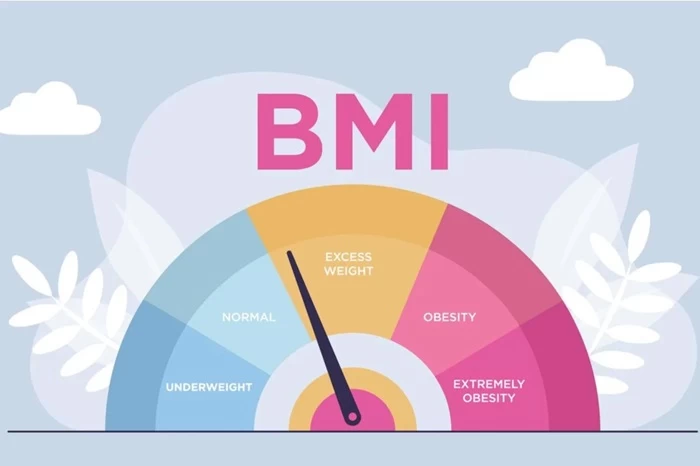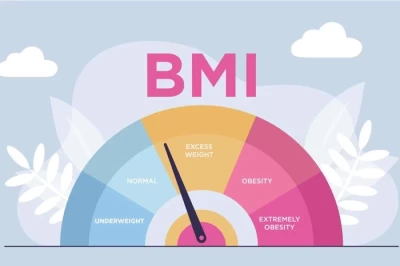How Do I Calculate My BMI?
Learn how online BMI calculators work, their features, accuracy, and usability. Discover the relevance of BMI in the context of personal health and wellness, as well as its limitations.
Body Mass Index (BMI) is a widely recognized and straightforward measure used to assess an individual's body composition and overall health. Online BMI calculators have become readily available and are used by millions to estimate their BMI quickly. In this review, we will examine the features, accuracy, and usability of online BMI calculators, as well as their relevance in the context of personal health and wellness.
Features and Functionality
Online BMI calculators typically feature a user-friendly interface where you input your weight and height. In return, they provide your BMI value and a general categorization of your weight status (e.g. underweight, average weight, overweight, or obese). Many calculators also display a visual representation of where your BMI falls on the BMI scale.
Accuracy and Consistency
The accuracy of online BMI calculators largely depends on the information you provide and the formula they use. The most commonly used formula for BMI calculation is the Quetelet Index, which is relatively simple but may not account for variations in body composition. While online calculators can give you a general idea of your BMI, it's essential to note that they do not consider factors like muscle mass or body fat percentage.
Usability and Accessibility
Online BMI calculators are incredibly user-friendly. They are accessible on various devices, including computers, smartphones, and tablets, making it easy for users to check their BMI on the go. Many websites and mobile apps offer BMI calculators for free, requiring only basic information to provide instant results.
Relevance in Personal Health and Wellness
Online BMI calculators play a significant role in promoting personal health and wellness. They offer a simple and quick way for individuals to monitor their weight status and identify potential health risks associated with being underweight or overweight. While BMI alone does not provide a complete picture of health, it can serve as an initial point of reference.
Limitations Associated With BMI Calculations
-
Lack of Precision
BMI calculators may not be precise for individuals with unique body compositions, such as athletes or those with high muscle mass. They can sometimes categorize fit individuals as overweight or obese based solely on height and weight.
-
Health Complexity
BMI is an essential measure and doesn't consider other important factors like body fat percentage, genetics, and overall health. For a more comprehensive assessment, consulting a healthcare professional is often necessary.
-
Age and Gender Differences
BMI calculations are not one-size-fits-all. Some calculators may provide options to account for age and gender, recognizing that BMI standards can differ for different demographics.

FAQs About the Online BMI Calculator
What is a BMI Calculator, and How Does it Work?
A BMI calculator is a tool that estimates your Body Mass Index (BMI) by using your weight and height. It calculates your BMI by dividing your weight in kilograms by the square of your height in meters (BMI = weight (kg) / (height (m))^2). The result provides a numerical value that is used to categorize your weight status.
How Do I Use an Online BMI Calculator?
To use an online BMI calculator, you typically input your weight and height into the designated fields. Click the "Calculate" or "Submit" button, and the calculator will provide your BMI value and may also categorize your weight status (e.g. underweight, average weight, overweight, or obese).
What Does My BMI Value Mean in Terms of My Health?
Your BMI value is used to categorize your weight status. While it can provide a general idea of whether you are underweight, average weight, overweight, or obese, it does not take into account other factors like muscle mass, body fat percentage, or overall health. For a more comprehensive health assessment, consult a healthcare professional.
Is BMI a Reliable Indicator of Health?
BMI is a simple and convenient tool for estimating body composition, but it has limitations. It may not be accurate for individuals with unique body compositions, such as athletes or those with high muscle mass. It should be used in conjunction with other health measures and assessments.
Can Age and Gender Affect BMI Calculations?
Yes, some BMI calculators offer options to account for age and gender, as BMI standards can vary among different demographics. It's essential to consider these factors when interpreting BMI results, especially in children and adolescents.
Can I Use an Online BMI Calculator for Children and Teenagers?
Some online BMI calculators provide options for calculating BMI for children and teenagers. It's essential to use calculators specifically designed for this age group, as their BMI categories differ from those used for adults.
How Often Should I Check My BMI?
The frequency of checking your BMI depends on your health goals and any specific recommendations from a healthcare provider. For general monitoring, checking it every few months or as part of a routine health assessment is common.
Is There a Preferred BMI Range for Good Health?
A BMI between 18.5 and 24.9 is often considered a healthy range for adults. However, various factors influence individual health, and BMI is just one part of a broader health assessment. Your specific health goals and needs should be discussed with a healthcare professional.
Can I Trust Online BMI Calculators to Be Accurate?
Online BMI calculators are generally accurate in providing a basic estimate of your BMI. However, their precision may vary depending on the specific calculator and the data you input. For personalized and precise health assessments, it's advisable to consult a healthcare professional.
Are There Alternative Ways to Assess Body Composition Besides BMI?
Yes, several alternative methods, such as body fat percentage measurements, waist-to-hip ratio, and skin fold thickness measurements, provide more detailed insights into body composition. These methods may be used in conjunction with or as alternatives to BMI for a more comprehensive assessment.
Online BMI calculators are simple and accessible tools for quickly estimating your body mass index. While they provide a valuable starting point for assessing your weight status and potential health risks, they have limitations, particularly regarding the precision of results for individuals with unique body compositions.
It's important to remember that BMI is just one part of a more comprehensive health assessment, and consulting with a healthcare professional for a more personalized evaluation is advisable for individuals with specific health concerns or goals. Online BMI calculators can serve as an initial step in your health and wellness journey, but they should be used in conjunction with a broader approach to maintaining and improving your well-being.
Body Mass Index (BMI) is a widely recognized and straightforward measure used to assess an individual's body composition and overall health. Online BMI calculators have become readily available and are used by millions to estimate their BMI quickly. In this review, we will examine the features, accuracy, and usability of online BMI calculators, as well as their relevance in the context of personal health and wellness.
Features and Functionality
Online BMI calculators typically feature a user-friendly interface where you input your weight and height. In return, they provide your BMI value and a general categorization of your weight status (e.g. underweight, average weight, overweight, or obese). Many calculators also display a visual representation of where your BMI falls on the BMI scale.
Accuracy and Consistency
The accuracy of online BMI calculators largely depends on the information you provide and the formula they use. The most commonly used formula for BMI calculation is the Quetelet Index, which is relatively simple but may not account for variations in body composition. While online calculators can give you a general idea of your BMI, it's essential to note that they do not consider factors like muscle mass or body fat percentage.
Usability and Accessibility
Online BMI calculators are incredibly user-friendly. They are accessible on various devices, including computers, smartphones, and tablets, making it easy for users to check their BMI on the go. Many websites and mobile apps offer BMI calculators for free, requiring only basic information to provide instant results.
Relevance in Personal Health and Wellness
Online BMI calculators play a significant role in promoting personal health and wellness. They offer a simple and quick way for individuals to monitor their weight status and identify potential health risks associated with being underweight or overweight. While BMI alone does not provide a complete picture of health, it can serve as an initial point of reference.
Limitations Associated With BMI Calculations
-
Lack of Precision
BMI calculators may not be precise for individuals with unique body compositions, such as athletes or those with high muscle mass. They can sometimes categorize fit individuals as overweight or obese based solely on height and weight.
-
Health Complexity
BMI is an essential measure and doesn't consider other important factors like body fat percentage, genetics, and overall health. For a more comprehensive assessment, consulting a healthcare professional is often necessary.
-
Age and Gender Differences
BMI calculations are not one-size-fits-all. Some calculators may provide options to account for age and gender, recognizing that BMI standards can differ for different demographics.

FAQs About the Online BMI Calculator
What is a BMI Calculator, and How Does it Work?
A BMI calculator is a tool that estimates your Body Mass Index (BMI) by using your weight and height. It calculates your BMI by dividing your weight in kilograms by the square of your height in meters (BMI = weight (kg) / (height (m))^2). The result provides a numerical value that is used to categorize your weight status.
How Do I Use an Online BMI Calculator?
To use an online BMI calculator, you typically input your weight and height into the designated fields. Click the "Calculate" or "Submit" button, and the calculator will provide your BMI value and may also categorize your weight status (e.g. underweight, average weight, overweight, or obese).
What Does My BMI Value Mean in Terms of My Health?
Your BMI value is used to categorize your weight status. While it can provide a general idea of whether you are underweight, average weight, overweight, or obese, it does not take into account other factors like muscle mass, body fat percentage, or overall health. For a more comprehensive health assessment, consult a healthcare professional.
Is BMI a Reliable Indicator of Health?
BMI is a simple and convenient tool for estimating body composition, but it has limitations. It may not be accurate for individuals with unique body compositions, such as athletes or those with high muscle mass. It should be used in conjunction with other health measures and assessments.
Can Age and Gender Affect BMI Calculations?
Yes, some BMI calculators offer options to account for age and gender, as BMI standards can vary among different demographics. It's essential to consider these factors when interpreting BMI results, especially in children and adolescents.
Can I Use an Online BMI Calculator for Children and Teenagers?
Some online BMI calculators provide options for calculating BMI for children and teenagers. It's essential to use calculators specifically designed for this age group, as their BMI categories differ from those used for adults.
How Often Should I Check My BMI?
The frequency of checking your BMI depends on your health goals and any specific recommendations from a healthcare provider. For general monitoring, checking it every few months or as part of a routine health assessment is common.
Is There a Preferred BMI Range for Good Health?
A BMI between 18.5 and 24.9 is often considered a healthy range for adults. However, various factors influence individual health, and BMI is just one part of a broader health assessment. Your specific health goals and needs should be discussed with a healthcare professional.
Can I Trust Online BMI Calculators to Be Accurate?
Online BMI calculators are generally accurate in providing a basic estimate of your BMI. However, their precision may vary depending on the specific calculator and the data you input. For personalized and precise health assessments, it's advisable to consult a healthcare professional.
Are There Alternative Ways to Assess Body Composition Besides BMI?
Yes, several alternative methods, such as body fat percentage measurements, waist-to-hip ratio, and skin fold thickness measurements, provide more detailed insights into body composition. These methods may be used in conjunction with or as alternatives to BMI for a more comprehensive assessment.
Online BMI calculators are simple and accessible tools for quickly estimating your body mass index. While they provide a valuable starting point for assessing your weight status and potential health risks, they have limitations, particularly regarding the precision of results for individuals with unique body compositions.
It's important to remember that BMI is just one part of a more comprehensive health assessment, and consulting with a healthcare professional for a more personalized evaluation is advisable for individuals with specific health concerns or goals. Online BMI calculators can serve as an initial step in your health and wellness journey, but they should be used in conjunction with a broader approach to maintaining and improving your well-being.
Conversation
Latest Blogs
© Blog CoolCalculator, Explore CoolCalculator, your destination for the latest insights, tips, and updates on the world of online calculators. Stay informed and make your calculations smarter with our blog. ,
Designed
by Saad Media Team , Team Lead M.Rizwan Akhtar














